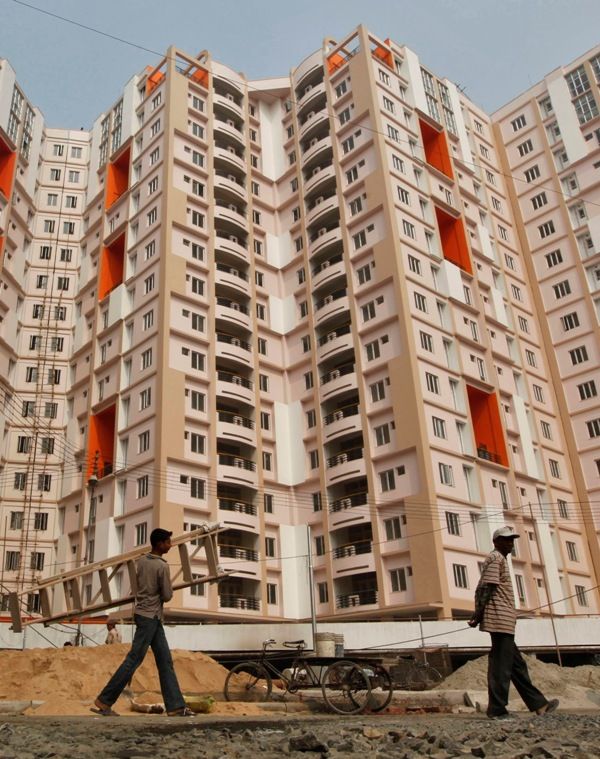
Homebuyers stand to benefit from the approval of the Real Estate Bill
With the Real Estate (Regulation and Development) Bill cleared by both houses of Parliament, it is only a matter of time before the regulatory mechanism is set up by all states.
Many malpractices within the sector, responsible for lack of consumer confidence and plummeting sales, are likely to get curbed with this Bill.
No profiting from information asymmetry: Earlier, developers took undue advantage of the fact that less information was available to the buyer than to them. Take one instance.
The builder would tell a customer that land acquisition had been completed for his project.
But not reveal that only 80 per cent had been completed, and he was embroiled in litigation over a patch of 20 per cent. Unfortunately, the apartment he sold to the buyer could have been slotted in the project plan on that very patch.
So even if the rest of the project got delivered on time, this customer’s possession got delayed.
Statutory permissions have been another major cause of delay.
At the time of selling, the developer would confidently tell buyers all permissions would come through in a few months. Later, the project would get delayed in the absence of some.
Now, registered projects must disclose a lot of accurate information -- status of land acquisition, statutory approvals, layout plan, etc -- to the regulator, which will put it up on its website.
No playing around with buyers’ money: A common practice among developers was to raise money from buyers for one project but not use it to complete that one.
They would use the money to buy land which would enable them to launch another project and raise more money from a new set of buyers.
This inevitably led to delays in delivery and hassles for buyers.
The latter would have to bear the burden of monthly instalments and rent simultaneously, and in case of a delay beyond three years, lose the tax benefit on their home loan.
With the Bill making it mandatory that 70 per cent of money raised from sales in a project will have to be put in an escrow account (states have the freedom to reduce this figure to 50 per cent), developers will find it difficult to divert money from one project to another.
“This clause will prevent shortage of funds and ensure timely delivery,” says Ashutosh Limaye, head of research at JLL India.
No discrepancy in penalties: In the past, if the buyer delayed payments, he had to pay a high rate of interest.
But, if the developer delayed on delivery, he paid a pittance. “Even this money would at times not be paid but be adjusted against final payment from the buyer,” says Pradeep Mishra, research head, indiazhousing.com.
Suppose a person purchased a 2-BHK flat of 1,100 sq ft for Rs 50 lakh. If he delayed payment, the interest would be as high as 18-24 per cent per year.
At 18 per cent, this translated into Rs 75,000 per month.
If the developer delayed payment, he would pay Rs 5-10 per sq ft per month. On an apartment of 1,100 sq ft, this would translate into barely Rs 5,500 per month.
This practice will end because the Bill specifies that penalties for both parties will be at par.
No changes in project plan at late stage: Developers would sell a project to buyers by painting an attractive picture but later change the building plans and specifications. For instance, the builder might have sold an apartment block with the proposition that it offers a view of the sea.
Later, a new set of apartments would come up, blocking this view.
Similarly, new apartment blocks would come up in what was earmarked as a green area. Another practice was to come up with an affordable housing component in what had been promoted as a luxury project.
Such shenanigans will have to end, with the Bill making it mandatory for the developer to get the permission of two-third of buyers to make changes to project plan.
“Developers will have to be very careful at the time of planning, as it will become difficult to change at a later stage.
They will also have to stick to their commitments to buyers,” says Sanjay Dutt, managing director, India, Cushman & Wakefield.
On the flip side, the need to get two-third consensus could also mean delays.
No delay in handing over charge to RWA: Developers would at times try to delay handing over charge of the project because they stood to benefit from this.
“If the FSI (floor space index) norm was increased in that area, the developer would be the beneficiary, as he could construct and sell more,” says Limaye.
Delaying the hand over would also allow errant developers to charge high rates for services and maintenance. The Bill makes it compulsory to form a resident welfare association after three months of handing over of a majority of units in the project.
Experts are hailing the Bill as a landmark event.
“It will bring transparency and accountability, offer protection to customers and give them the confidence to invest in real estate,” says Anshuman Magazine, chairman and managing director, CBRE South Asia. Nonetheless, buyers should not lower their guard right away.
SOME ADDITIONAL BENEFITS
- Pay cost of apartment based on carpet area, easier to measure
- Pay lower interest charges on delayed payment to developer
- No need to bear burden of EMI and rent simultaneously
- Earn rent from your apartment and use it to part-pay EMI
- Pay lower maintenance charges if resident welfare association formed on time
The image is used for representational purpose only. Photograph: Reuters











